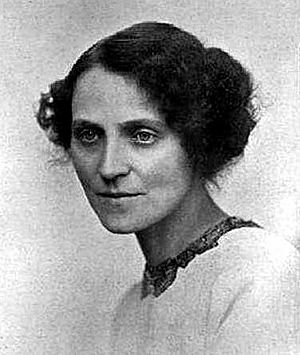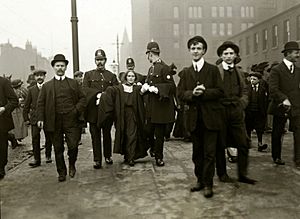Dora Marsden facts for kids
Quick facts for kids
Dora Marsden
|
|
|---|---|

Marsden in 1912
|
|
| Born | Dora Marsden 5 March 1882 Marsden, Yorkshire, England |
| Died | 13 December 1960 (aged 78) Dumfries, Scotland |
| Occupation | editor, essayist, suffragist, philosopher, feminist |
| Nationality | English |
| Literary movement | women's suffrage, feminism, anarchism, modernism |
| Notable works | The Freewoman
The New Freewoman The Egoist |
Dora Marsden (born March 5, 1882 – died December 13, 1960) was an English writer and activist. She fought for women's rights. She also edited important magazines and was a philosopher.
Dora started her career helping women get the right to vote. She later created her own magazines. These magazines shared new and bold ideas. She is remembered for her work in the women's suffrage movement. She also helped shape new ideas in literature and philosophy.
Contents
Early Life and Activism
Dora Marsden was born in Marsden, Yorkshire, England. Her parents, Fred and Hannah, worked hard. When Dora was eight, her father moved to the U.S. for work. Her mother worked as a seamstress to support the family. They lived in poverty.
Dora was one of the first children to benefit from a new law. This law, from 1870, made it possible for all children to go to school. She was a very good student. At 13, she worked as a tutor. At 18, she won a special scholarship. This allowed her to attend Owens College in Manchester.
In 1903, Dora graduated from college. She taught school for several years. By 1908, she became a headmistress.
Dora was a strong supporter of women's voting rights. In 1909, she was arrested with other activists. They were protesting how some jailed suffragists were treated. A few months later, she protested at a rally. She waited 15 hours to speak out against Winston Churchill. He was a powerful politician at the time.
Dora's dedication led her to work for the Women's Social and Political Union (WSPU). This group was led by Christabel and Emmeline Pankhurst. Dora left her teaching job to join them in 1909.
However, Dora had her own strong ideas. She often disagreed with the WSPU leaders. They found her hard to manage. In 1911, Dora left the WSPU. She still wanted to help the women's movement. She decided to find other ways to share new ideas.
Work as an Editor
Many women disagreed with the WSPU's strict rules. Dora decided to start her own magazine. It was called The Freewoman. This magazine would share different views from the women's movement. Later, it included other new ideas too.
Dora started three magazines between 1911 and 1918:
- The Freewoman: November 1911 – October 1912
- The New Freewoman: June 1913 – December 1913
- The Egoist: January 1914 – December 1919
These magazines showed Dora's changing interests. They were closely related but not exactly the same. The New Freewoman and The Egoist were more similar to each other.
Around 1911, Dora became interested in ideas about individual freedom. This change was clear in her writings. Her magazines began to discuss many topics. These topics were important to thinkers who believed in individual freedom. Many of these thinkers were also interested in new art and writing styles.
The Freewoman
The Freewoman was Dora's first magazine. She started it to share her thoughts. She also wanted to criticize the WSPU. She felt the WSPU focused too much on middle-class women.
The magazine also explored London's literary scene. It was a place for feminists and other groups to debate ideas. It was known for its bold advertisements. These ads were often for businesses that supported women.
The magazine discussed many important and sometimes controversial topics. After it ran into money problems, it became The New Freewoman.
The New Freewoman
The New Freewoman had a different focus. It moved from radical feminism to ideas about individual freedom and new writing styles. The bold ads were replaced with text-only ads.
This magazine showed Dora's growing interest in a philosophy called egoism. This idea was greatly influenced by the writer Ezra Pound.
Rebecca West and Mary Gawthorpe helped these two magazines. They worked to get more readers for The New Freewoman. They did this by adding more literary content. This brought in more writers and readers. Even though The New Freewoman did not last long, it led to the very popular magazine The Egoist.
The Egoist
Later Life
Dora Marsden wrote a very important work later in her life. However, it was not well received by others. She faced difficulties in the 1930s. Her mother passed away in 1935.
In 1935, Dora went to live at the Crichton Royal Hospital in Scotland. She stayed there for the rest of her life. Dora Marsden died on December 13, 1960, at the age of 78.
See also
 In Spanish: Dora Marsden para niños
In Spanish: Dora Marsden para niños
 | Stephanie Wilson |
 | Charles Bolden |
 | Ronald McNair |
 | Frederick D. Gregory |


